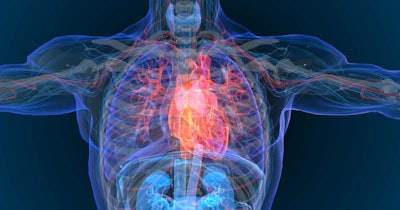
Researchers found that a frequently used biomarker for heart injury has potential to help COVID-19 patients avoid hospitalization.
A study published Friday in the journal PLOS ONE investigated the diagnostic properties of the protein cardiac troponin and its potential for use in mainstream clinical practice to evaluate COVID-19 patients. The marker is already in clinical use in tests to evaluate patients for heart conditions.
Risk-stratifying -- identifying patients’ degree of risk for COVID-19 mortality -- is important in helping clinicians decide which patients need more medical attention and which patients can be safely discharged. Since COVID-19 seems to have the ability to affect people’s hearts, in addition to their lungs, looking for heart injury is essential. The literature shows that patients with heart injury have poorer COVID-19 prognoses than those with none.
Cardiac troponins, proteins that form part of the heart’s contractile machinery, are released into the bloodstream when the heart is damaged. They can be measured in a blood test that is widely used in the assessment of heart conditions, including heart attacks. Recent studies show that COVID-19 patients with elevated troponin levels are more likely to die or suffer adverse clinical outcomes than those with normal troponin levels. However, cardiac troponins are not commonly used in clinical practice to directly risk-stratify COVID-19 patients. This study sought to find out why.
Researchers retrospectively looked at the ability of a subtype of cardiac troponin -- high-sensitivity cardiac troponin T -- to predict which of 191 COVID-19 patients suffered mortality and which patients did not. Since in diverse patient populations factors other than heart damage can cause elevated troponin levels, they found that elevated troponin tests were inaccurate in predicting an individual patient’s risk of death. Thus, using cardiac troponin alone to risk-stratify patients is not advised.
Conversely, the researchers found that COVID-19 patients with normal cardiac troponin levels had very good prognoses. Since normal troponin levels may rule out illnesses and complications that put patients at high risk, this measure could potentially help identify low-risk patients.
As a high troponin level is not linked to a poor COVID-19 prognoses, it is unlikely to accurately identify a high-risk patient, the researchers concluded. Instead, they believe a normal troponin level may help rule out the risk of death. This might set the stage for future validation of the rule-out use of normal troponins and facilitate the use of troponin tests in the COVID-19 clinical arena.
“This study may be one small step towards clinical translation but potentially a giant leap for identifying the direction in which we need to go with COVID-19 risk-stratification,” Dr. Alexander Liu, a co-author and researcher at the University of St. Andrews School of Medicine, said in a statement. “The ultimate vision is to open up the possibility of using cardiac troponins to help doctors send patients home safely, reducing their risk of hospital exposure and potentially saving lives and millions for healthcare systems.”



















